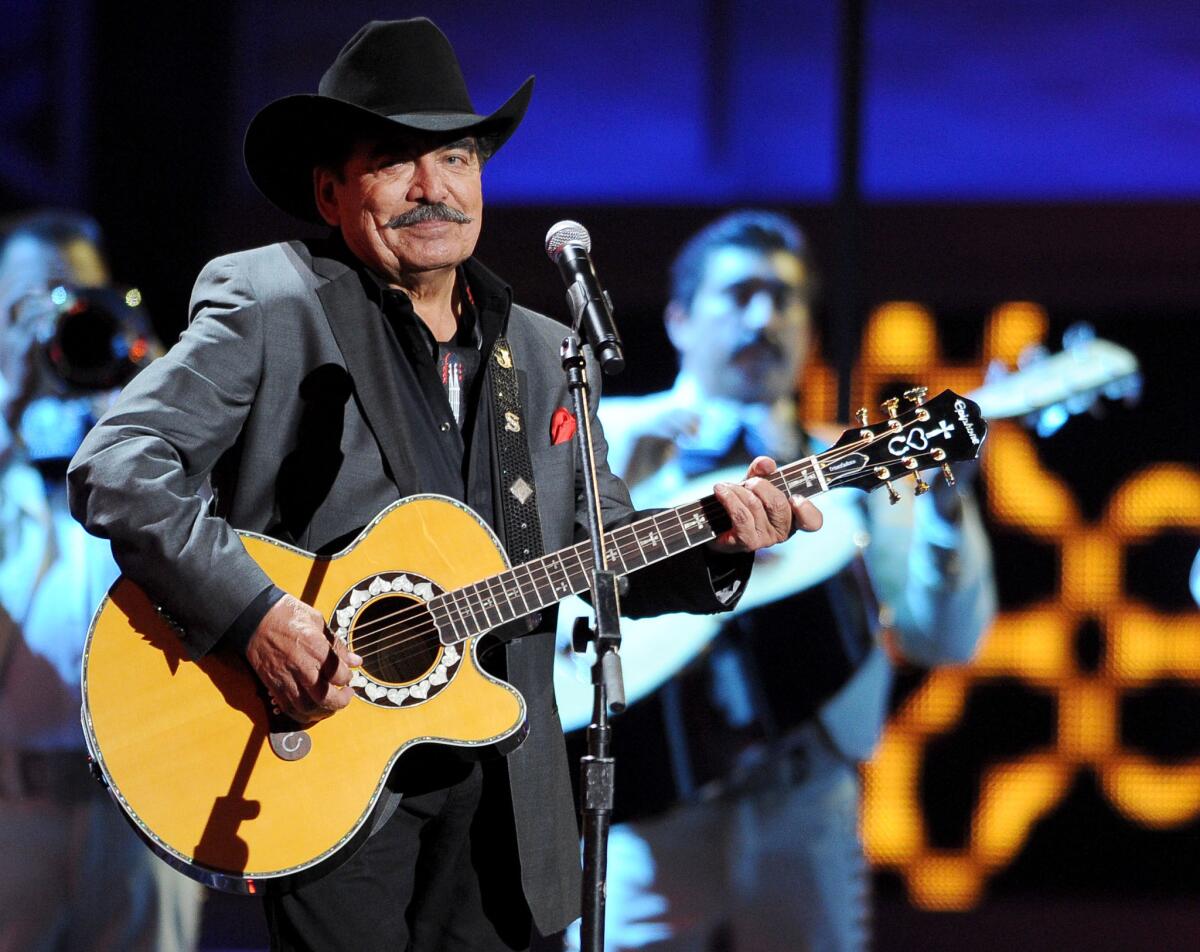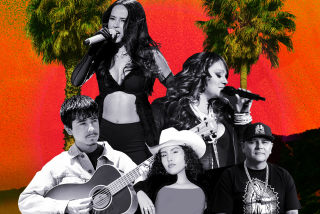Mexican ballad singer Joan Sebastian dies at 64

Joan Sebastian performs at the Latin Grammy Awards at the Mandalay Bay Hotel and Casino in Las Vegas on Nov. 15, 2012.
When in his prime, beloved Mexican singer Joan Sebastian didn’t just walk onto a stage.
He burst out on a leaping horse, breaking into one of his hit songs about love and loss — both of which he had in abundance in his life — as an orchestra of as many as 40 musicians gave stirring accompaniment.
The horses (Sebastian would change to different ones during concerts, much like other performers changed costumes) were part of the act, whether in outdoor arenas or indoor venues such as Staples Center. But it wasn’t just a gimmick.
“He was an artist who took on an iconic status as a singer of the people,” said Josh Kun, a USC associate professor who specializes in U.S.-Mexico border arts and politics. Sebastian’s audience, Kun said, was in large part made up of working class and working poor people who faced struggles, both in Mexico and the U.S.
“When he would ride in to start his shows,” Kun said, “it would make a connection back to the rural ranch.”
Sebastian, 64, who won four Grammys and seven Latin Grammys died Friday on his ranch in Teacalco, in Mexico’s Guerrero state, said close family friend Luis Zorro Estrada.
The singer, who specialized in regional Mexican styles but also made slicker Latin pop recordings, had been battling cancer since the late 1990s and was hospitalized many times, including at City of Hope in Duarte. Although his doctors had told him to stop riding his horses — who would famously prance to keep time with the music — he refused to give them up completely and was still using them on tour in the U.S. in 2012.
His songs and story — including several marriages and other romances — were mostly known to Spanish-speaking audiences. But will.i.am of the Black Eyed Peas was a fan of his music and visited him in 2012 in Mexico City where they collaborated on a recording, “Hey You,” that was released in a club dance version.
Television host Yarel Ramos interviewed Sebastian several times on her “Reventon” show on Telemundo. She said his songwriting ability, romantic singing style and vigorous performances were at the heart of his popularity. But his difficulties — not only from the disease, but also from poverty in his early life and the loss of two sons killed in separate gunshot incidents — also resonated with audiences.
“He went through a lot of tragedy, a lot of pain,” Ramos said. “But even all those years he was suffering with cancer, he was still performing, still releasing music, still writing songs of nostalgia about the love of his town.”
He was born Jose Manuel Figueroa on April 8, 1951, in the small town of Juliantla, Guerrero, Mexico. According to a 2012 New York Times profile, his cowboy father managed to buy him a transistor radio on which he listened not only to Mexican music but also country songs from Nashville.
At 14 he entered a seminary, intending to be a priest, but three years later he fell in love with a young woman who visited her brother. At that point, he chose music and romance over a religious vocation.
He worked odd jobs and eventually made his way to Chicago. “I remember arriving on the red-eye at O’Hare, wearing just a Western shirt jacket,” he told the Chicago Sun-Times in 2010. “I had no money. But I had the feeling that something special was going to happen in my life.”
He fell in love again, had three children, and worked as a dishwasher and used-car salesman. But he constantly practiced his music, often walking the streets, playing his guitar.
Eventually, he took on the stage name Joan (pronounced Juan) Sebastian and in the late 1970s played for Latino audiences in the U.S. Southwest, building a following.
In 1981, Sebastian began performing on horseback and got the nickname “El Rey del Jaripeo” (“King of the Rodeo”). He was known to sing in several styles, including banda, ranchera and norteño, and he recorded more than 35 albums. His songs were covered by numerous artists.
“Through the years, I’ve realized I can only compose from my own experiences,” he told Billboard in 2006. “I’ve seldom been able to write for other people, but I am lucky that my songs have served other people.”
Among his many hits were “Secreto de Amor” and “Julian,” a song for one of his sons (who in turn was named for Sebastian’s home town).
His son Trigo Figueroa, who lived in Irvine, was shot and killed after one of his father’s concerts in 2006. Four years later, his son Juan Figueroa was shot and killed in a nightclub in Mexico.
In addition to Julian, Sebastian is reportedly survived by five other children.
In his later years, it was clear the cancer he was battling had taken its toll. Sebastian, who had been known to play concerts that went on for hours to the delight of the crowd, sometimes seemed to tire during performances. But he resisted slowing down.
“I’m singing and I’m healthy,” he told the Chicago Sun-Times in 2010. “I have a lot of dreams. I have this love for life I would like to continue to give to my people.
“Let’s live, let’s be happy.”
Hoy staff writer Tommy Calle contributed to this report.
More to Read
Start your day right
Sign up for Essential California for the L.A. Times biggest news, features and recommendations in your inbox six days a week.
You may occasionally receive promotional content from the Los Angeles Times.







